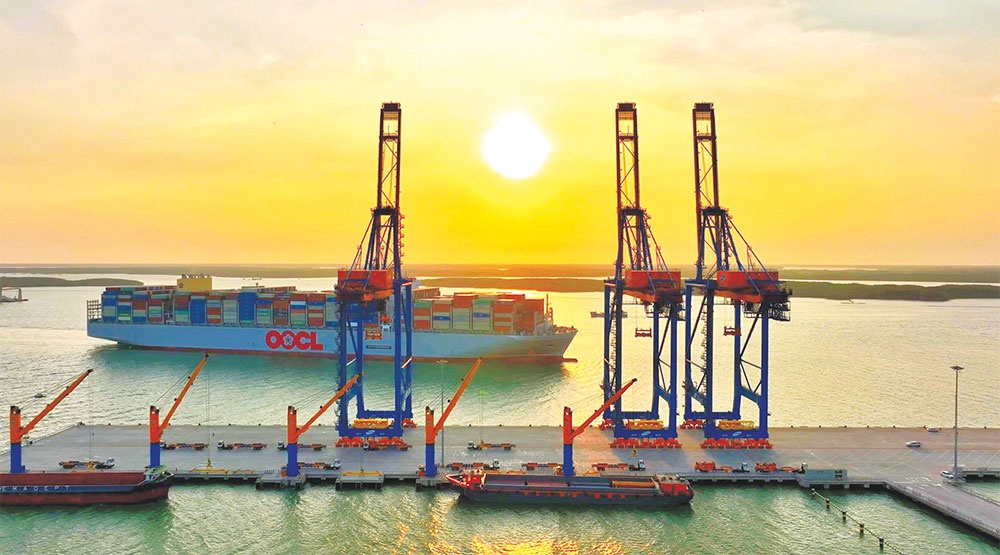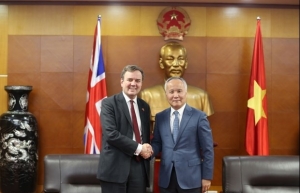UK’s entry to CPTPP makes deal go global
The UK on March 31 announced the conclusion of talks with member countries of agreement (CPTPP), which is a vast free trade area spanning the Indo-Pacific, after 21 months of negotiations.
 |
| UK’s entry to CPTPP makes deal go global |
The bloc is home to over 500 million people and will have a total GDP of $13.53 trillion once the UK joins.
“As the fifth-largest economy in the world by GDP in 2021 and with a market of 67 million consumers, the UK is an attractive market for Vietnam. Expanding the CPTPP to include the UK will help the agreement to diversify their supply chains, remove trading barriers, and encourage more trade for our businesses,” said a statement from the British Embassy to Vietnam.
According to UK business secretary Kemi Badenoch, joining the trade bloc will also mean more than 99 per cent of UK goods exports to CPTPP member states will be eligible for zero tariffs. “In the long run, it could boost the UK economy by £1.8 billion ($2.21 billion) and lead to a £1.7 billion ($2.09 billion) increase in UK exports to CPTPP countries as result of the reduction of barriers across goods and services, according to the UK government’s published scoping assessment.”
The UK is the first European country to join the dynamic trade bloc, and the first new member since CPTPP was created, taking it from a Pacific agreement to a truly global one. The UK’s accession could mean lower tariffs on some exports to this market which are not already removed through the UK’s bilateral agreements with member countries, including Vietnam.
UK membership could also benefit businesses and investors in Vietnam through modern rules that make it easier to establish, operate investments and do business in the UK, according to the embassy.
“As for Vietnam, joining the CPTPP will complement our existing UK-Vietnam Free Trade Agreement (UKVFTA), upgrading our bilateral relationship with additional preferential tariffs,” the embassy said. “The removal of trade barriers will support our mutual economic security by deepening participation in each other’s supply chains and diversifying our trade.”
British Ambassador to Vietnam Iain Frew said, “This is an important milestone for the UK’s trade relations with Asia-Pacific countries. UK’s accession will contribute additional economic strength to this progressive and dynamic trade alliance, adding £2 trillion ($2.46 trillion) to the combined GDP of the bloc.”
The British government had been under fire to boost its trade after leaving the EU, but some detractors said that joining a bloc like the CPTPP means not only little benefit, but also that some standards will be lowered in the UK, meaning a raw deal in various sectors.
In addition, according to The House of Commons Library, a research service based in the UK Parliament, the economic benefits from the CPTPP appear to be small. The UK government’s scoping assessment indicated that the long-run increase in GDP would be 0.08 per cent. Trade expert Sam Lowe pointed out that this is largely because the UK already has bilateral trade agreements with most CPTPP members.
Concerns have been raised that the UK might import more palm oil as a result of the CPTPP’s tariff reductions on the product. The UK’s current tariff on imports of palm oil from Malaysia, with whom the UK does not currently have a bilateral FTA, ranges between 0-12 per cent. These tariffs will be reduced to zero when the CPTPP enters into force for the UK. Environmental groups argue that palm oil production is linked to deforestation and damages the habitats of orangutans.
A spokesperson for the UK’s Department of Business and Trade told the Guardian, “The UK is committed to tackling illegal deforestation within our supply chains, and our agreement to join the CPTPP does not change that.”
At present, the Vietnam-UK trade and investment ties are largely driven by the UKVFTA which took effect in May 2021, in addition to the Southeast Asian economy’s improved investment and business climate.
Once the CPTPP enters into force with tariff reductions and removal, businesses from the UK and Vietnam can select the CPTPP or the UKVFTA to apply for their exports to their respective markets based on their own conditions and ability to meet requirements under each agreement. If they fail to meet the requirements, their exports will not be able to benefit from any incentives from both agreements and instead, still have be subject to export conditions as usually applied.
As part of the UKVFTA, 85.6 per cent of tariff lines for goods imported by the UK from Vietnam were eliminated in January 2021, and 99.2 per cent will be removed by January 2027, according to the UK’s Department for International Trade.
| Additional benefits of UK accession to CPTPP - Boosting services: The UK is the world’s second-largest services provider and services accounted for 43 per cent of this nation’ trade with CPTPP member states last year. Joining the bloc will slash red tape – British firms will not be required to establish a local office or be resident to supply a service, and will be able to operate on a par with local firms. - Increased flexibility: Modern rules of origin could make British businesses more competitive by allowing them to trade more freely across the bloc. For example, UK car manufacturers could sell engines tariff-free to a carmaker in the bloc who could then sell those cars tariff-free to any member country. This is currently not possible under all the bilateral trade agreements the UK has in place with CPTPP members, and will help exporters diversify their supply chains and create new export opportunities. - Pro-investment: Investment between the UK and CPTPP countries is expected to increase, as the agreement contains provisions to limit barriers and encourage more inward investment. Inward investment stocks to the UK from CPTPP countries were worth £182 billion ($223.75 billion) in 2021. - Cutting-edge: Remotely delivered services from the UK to the CPTPP were worth £20.5 billion ($25.2 billion) in 2020. The CPTPP sets modern rules for digital trade across all sectors of the economy and will support UK businesses of all sizes to seek new opportunities in CPTPP markets. Source: UK Scotland Office and UK Department for Business and Trade |
 | British official in Vietnam to boost accession to CPTPP Minister of State Greg Hands of the UK Department for International Trade arrived in Hanoi on February 1 for high-level trade talks on how the UK joining of the Comprehensive and Progressive Agreement for Trans-Pacific Partnership (CPTPP) will boost the economic firepower of the world’s most dynamic trade bloc, according to the British Embassy. |
What the stars mean:
★ Poor ★ ★ Promising ★★★ Good ★★★★ Very good ★★★★★ Exceptional
Related Contents
Latest News
More News
- Hermes joins Long Thanh cargo terminal development (February 04, 2026 | 15:59)
- SCG enhances production and distribution in Vietnam (February 04, 2026 | 08:00)
- UNIVACCO strengthens Asia expansion with Vietnam facility (February 03, 2026 | 08:00)
- Cai Mep Ha Port project wins approval with $1.95bn investment (February 02, 2026 | 16:17)
- Repositioning Vietnam in Asia’s manufacturing race (February 02, 2026 | 16:00)
- Manufacturing growth remains solid in early 2026 (February 02, 2026 | 15:28)
- Navigating venture capital trends across the continent (February 02, 2026 | 14:00)
- Motivations to achieve high growth (February 02, 2026 | 11:00)
- Capacity and regulations among British areas of expertise in IFCs (February 02, 2026 | 09:09)
- Transition underway in German investment across Vietnam (February 02, 2026 | 08:00)

 Tag:
Tag:
















 Mobile Version
Mobile Version